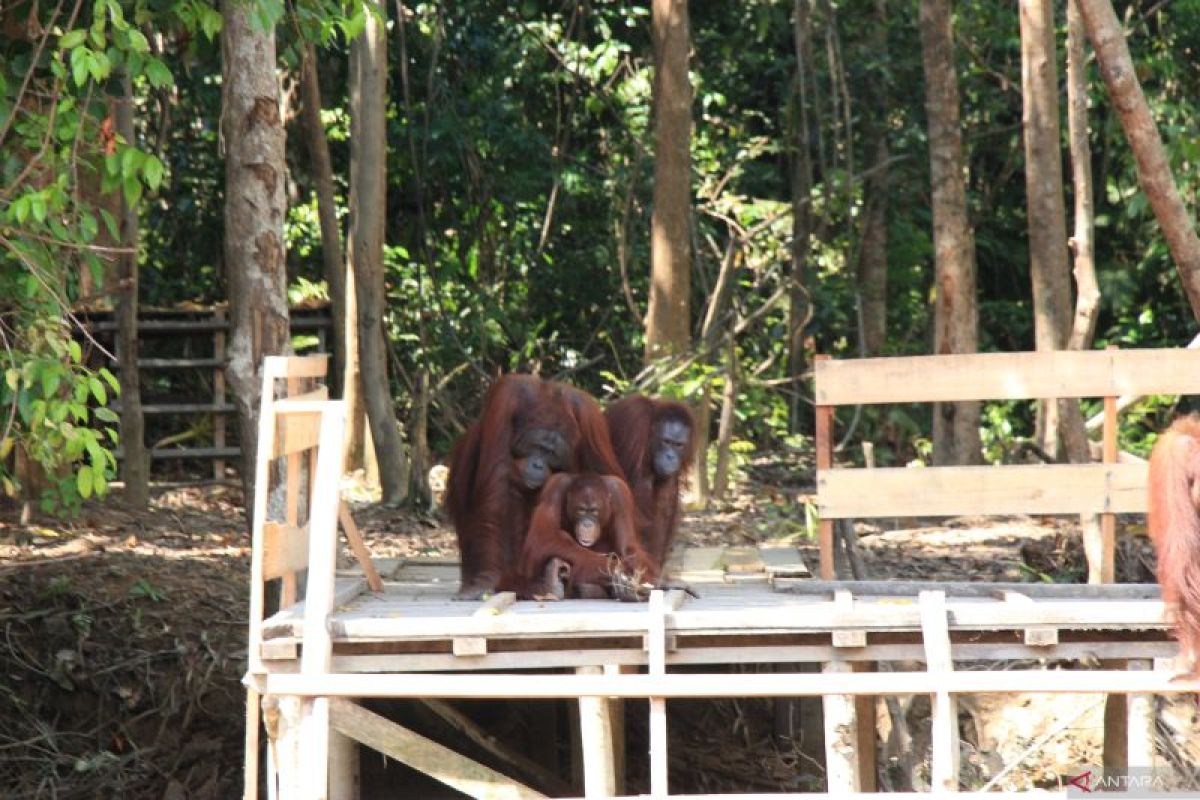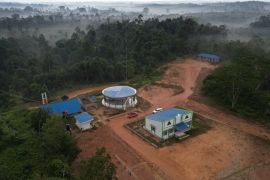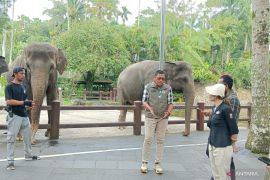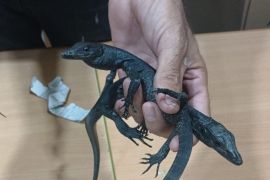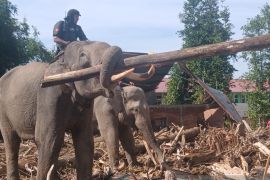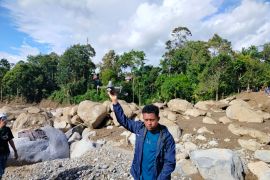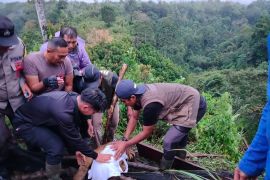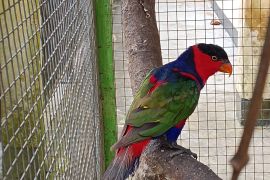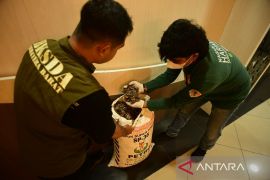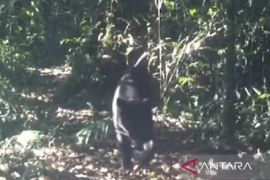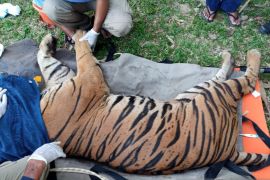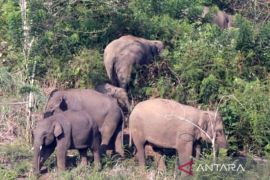The existence of the highly intelligent apes, in actuality, is of chief value in the eyes of the international community, as in the case of China’s pandas and Australia’s kangaroos.
While enjoying such value, Bornean orangutans were declared an endangered species by the International Union for Conservation of Nature in 1994.
Domestically speaking, Indonesia had already passed Law No. 9 of 1990 concerning the conservation of natural biological resources and their ecosystems, placing the iconic apes on the list of protected animals.
Central Kalimantan Natural Resources Conservation Agency (BKSDA) Head, Persada Agussetia Sitepu, attributed the steady decline in the population of orangutans to those hunting and trading the species.
According to Sitepu, the unfavorable trend was also due to the damages inflicted on forests, the species’ homes, fires, and illicit acts, which also led to a shortage of natural food supplies.
To that effect, orangutans are forced to venture into a new area in the hopes of locating food resources, with plantation zones managed by companies or local residents being a viable option, ultimately triggering yet another case of human-wildlife conflict.
“Such a conflict has frequently resulted in the death of the diurnal apes,” Sitepu pointed out.
Conflict prevention
A 2016 population and habitat viability analysis (PHVA) of orangutans estimated the total population of orangutans inhabiting Indonesia’s Sumatra Island and the Indonesian and Malaysian parts of Kalimantan or Borneo Island to be around 71,820.
Of the total count, Bornean orangutans, inhabiting a total area of 18,169,200 hectares, accounted for 57,350 belonging to 42 population groups, 18 of which possess the prospects of flourishing in the next one to five centuries.
In order for orangutans to thrive, humans must take measures to anticipate conflicts by adopting a holistic approach that entails the involvement of a range of sides, including governments, non-governmental organizations, companies, and local people.
The Central Kalimantan BKSDA has been playing an active role in supporting orangutans’ sustainability by employing programs aimed at conserving and rehabilitating the habitats of the critically endangered apes without hindering development projects.
In an effort to prevent a human-orangutan conflict, the BKSDA is striving to ensure that companies involved in the production of palm oil, lumber, and other commodities are compliant with determined sustainability standards and stringent social responsibilities.
In collaboration with law enforcers, the conservation institution has been investing time and efforts to take firm actions against the hunting, capturing, and trading of Bornean orangutans.
The need for regional governments and relevant stakeholders to create wildlife crossings has also been voiced.
Additionally, the Central Kalimantan BSKDA has continued to maintain partnerships with non-governmental organizations, such as the Borneo Orangutan Survival and Orangutan Foundation International, to rescue, rehabilitate, and release orangutans.
Wildlife-friendly village
Efforts aimed at boosting the locals’ awareness of the importance of conservation and their active participation are believed to be the key to ensuring an everlasting harmony between humans and orangutans.
“To this end, Madam Environment and Forestry Minister (Siti Nurbaya) has designated Tahawa as a wildlife-friendly village,” Sitepu from the Central Kalimantan BKSDA stated.
Situated within the district of Pulang Pisau, Tahawa Village is accessible through an approximate 1.5-hour overland trip by four-wheeled vehicles from Central Kalimantan’s capital city of Palangka Raya.
Tahawa Village is home to a forest that sits in the middle of industrial plantation areas, making the forest an appealing hunting ground for hunters coming from outside the village.
This condition has moved Tahawa villagers to play an active role in ensuring the sustainability of the forest along with the biodiversity it hosts.
To support the central government’s initiative, the Central Kalimantan BKSDA has been providing assistance and guidance to Tahawa and nearby villages to adopt the concept of a wildlife-friendly village.
The BKSDA has moved to collect data on villages to identify those that have the potential to emerge as another wildlife-friendly zone.
Once a village is declared friendly to wildlife, it is expected to be a location for the release or relocation of rescued wild animals in Central Kalimantan.
Based on monitoring in 2022, Tahawa Village is home to a variety of protected animals, such as orangutans, Bornean white-bearded gibbons, paradise flycatchers, trogons, Bornean bristleheads, tragulus or mouse deer, barking deer, jungle cats, tarsius, and pangolins.
Owing to its wealth of biodiversity, Tahawa is envisioned as a wildlife tourism village managed independently by its residents. Moreover, the BSKDA has continued to train villagers, equipping them with the ability to track the traces of animals, thereby presenting them with an opportunity to work as a tour guide for wildlife-loving visitors.
Currently, the Central Kalimantan BSKDA is managing a conservation area of 539,296.67 hectares, accounting for only 3.51 percent of the total area of Central Kalimantan Province.
Meanwhile, striving for biodiversity sustainability outside the conservation area is equally important. Thus, the establishment of a wildlife-friendly village can be regarded as the government’s initiative to expand its care beyond a conservation zone.
It should be noted that the idea of such a village is essentially based on the goal of harmonizing the activities and interests of humans and wild animals living in the same area.
Head of Central Kalimantan BKSDA’s Pangkalan Bun Conservation Region, Dendi Sutiadi, said that his side has taken intensive conflict mitigation measures while nurturing partnerships with locals in order to pave the way for the establishment of another wildlife-friendly village.
Additionally, the conservation body has been active in spreading the word against the hunting and killing of wild animals and reminding companies to ensure that their activities do not pose threats to wildlife.
Everyone should always bear in mind that Kalimantan’s forests are meant to be a shared home for both humans and wildlife.
Synchronized, collaborative actions are of the essence to ensure that forests, wildlife, and humans can thrive at no expense to others.
Related news: Government ensures orangutan habitat unharmed by IKN development
Related news: Three orangutan traders arrested in Aceh Tamiang
Related news: Four orangutans released into East Kalimantan protected forest
Translator: Rendhik A, Tegar Nurfitra
Editor: Azis Kurmala
Copyright © ANTARA 2024
